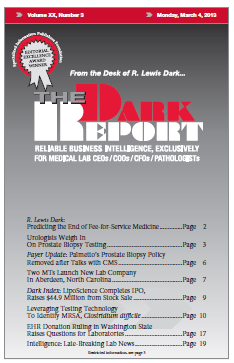CEO SUMMARY: Although located in the same region as two of the nation’s largest laboratory companies, newly-created Triune Laboratory, Inc., is reporting steady growth and acceptance by physicians in the community. Founded by two medical technologists and partially funded by a pathologist, this new lab company demonstrates that many physicians are ready to support an …
Two MTs Launch New Lab In Aberdeen, North Carolina Read More »
To access this post, you must purchase The Dark Report.


